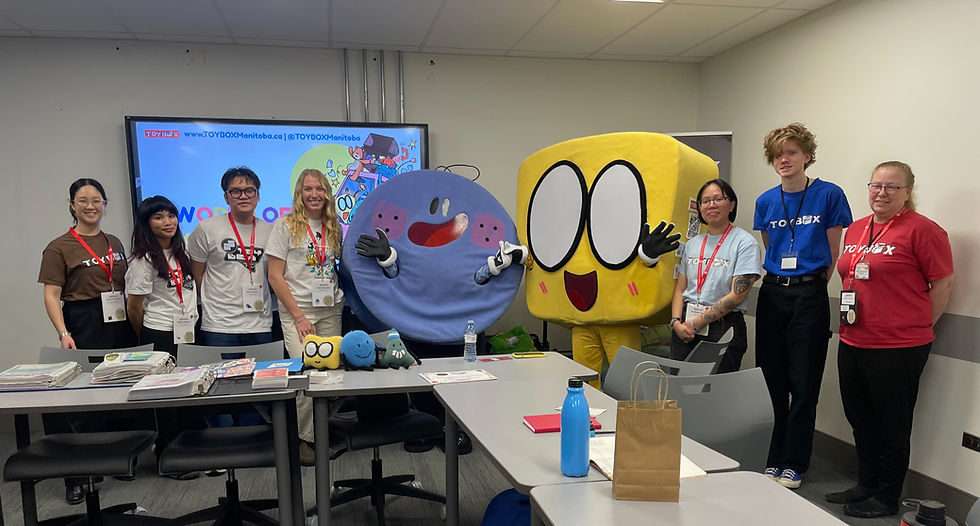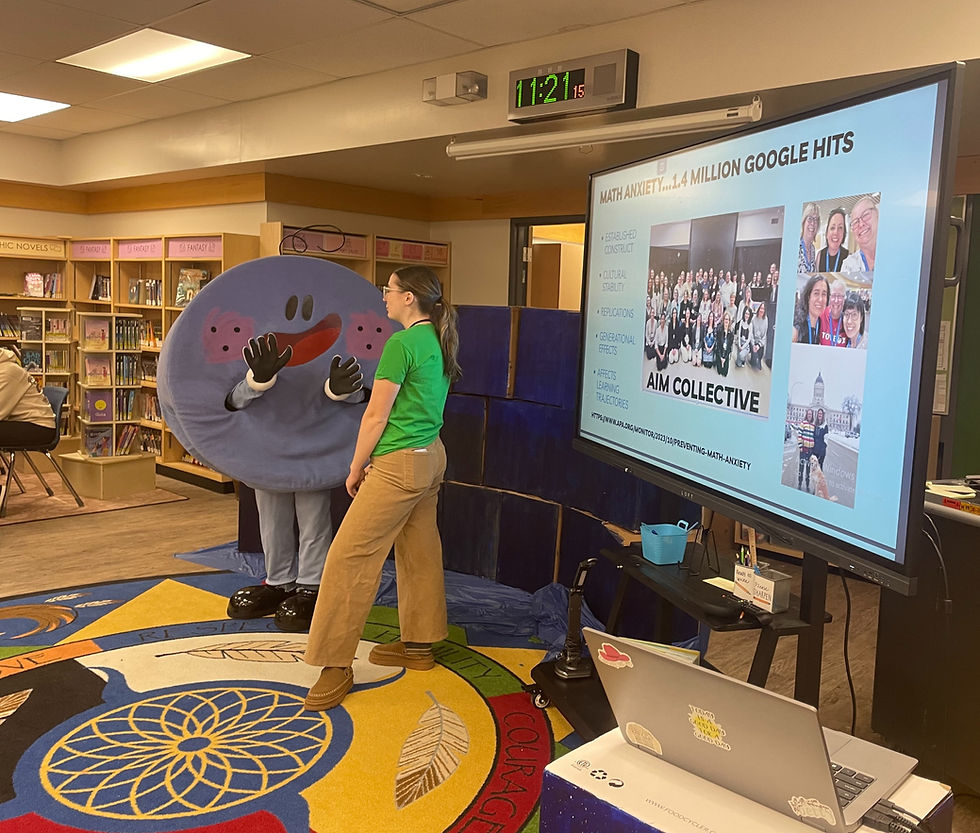TOYBOX in Churchill!
- Taylor Bear

- Nov 30, 2024
- 5 min read
Updated: Dec 3, 2024
Recently, the TOYBOX team had the amazing opportunity to visit Churchill! During our visit, we were hosted by Duke of Marlborough School and were given the wonderful opportunity to bring TOYBOX to Churchill!

Sheri's Reflection
My highlight of the journey to Churchill was meeting the children at Duke of Marlborough School and learning about living in a remote northern community from their perspective. The children told us how to be safe around polar bears and how to live in a very cold climate. They were so proud to show us their fluent counting knowledge in Cree. It was so rewarding to share the specially designed TOYBOX playing cards and see the excitement from the children as they discovered that the cards increased to 20 and for their teachers to request classroom sets (coming soon)! The group I worked with made snakes using the cards, and we talked about creating different layouts of the snakes and ways to estimate quantity.

In the evening, we hosted a TOYBOX family fun night. Since we had met most of the children during the daytime events, it was a welcome sight as they introduced us to their families. A treasure was watching a preschooler hop along a number line as a parent interacted, while other families played number BINGO with their children. The parents reiterated the unique experiences of raising children in a remote community. For example, everyone orders goods through London Drugs because the company offers free shipping. Additionally, families work around travel for medical appointments- an orthodontist appointment can require a 16-hour one-way overnight train ride to Thompson, and only on the sporadic days that the train operates. Caregivers are used to solo parenting to accommodate out-of-town travel or tourist operations during peak seasons. The school principal, Shawn Manning, and two librarians helped us to understand how resources are shared within the community. We are grateful to them for advertising the TOYBOX project in signage we saw around town, and for welcoming us into the school during the busy polar bear season.
Mane’s Reflection
The Duke of Marlborough School visit was my first (and hopefully the first of many) activity with the TOYBOX team. I am thankful for the opportunity to spend time with children and families around educational activities and resources. I work in Chile, conducting research with children and their families to support learning from an early age. The experience at the school in Churchill allowed me to see further how children develop and learn in diverse conditions and the power of engaging families in their educational process. I learned their value for the community from the children and several exciting things about polar bears and their habitats.

I enjoyed spending time with the children and seeing how they explored the TOYBOX cards at the different stations. I was amazed by their creativity in finding other ways to combine numbers and come up with alternative answers to additions. I also enjoyed working with children of different ages and seeing how they could take advantage of the TOYBOX materials and resources as they are developmentally appropriate for a wide range of them. Finally, the family night activity showed me how mothers, fathers, and other primary caregivers enjoy actively participating in children’s learning. Playing Bingo with them motivated me to think of different ways of actively working with families to foster children’s education here and in Chile.
On a personal note, being with my family (husband and two daughters) in both day activities with children and family night allowed me to share how we engage with families around numbers and math and the value of the work done by TOYBOX. My family loved the work done at the school and the opportunity to share with children and parents in Churchill.
Paul's Reflection
I had the pleasure of traveling to Churchill to represent ToyBox. We worked with both parents and children living in the community. During our work with the children, we observed their excitement in completing various numeracy tasks and games using our ToyBox playing cards. I was especially happy when several students taught me how to count to 10 in Cree, and one of the school staff gave me the list of Cree words as well as permission to use these in a future ToyBox strategy.

We also worked with the parents with a Bingo activity to illustrate possibilities for parent-child numeracy experiences. I observed the parents and children enjoying their time together, as well as engaging with numeracy tasks. For example, one child-parent dyad kept tying while playing Bingo, even though their Bingo cards we different, and an interesting conversation arose as to why this was happening. We also observed fundamental numeracy concepts such as counting, number naming, matching and decomposition. I know it was a valuable experience for all involved because the school principal invited us to return to Churchill.
Stephanie's Reflection
Travelling to Churchill with Toybox Manitoba to share evidence-informed educational activities with students and their families from the Duke of Malborough School was a memorable experience for many reasons. Before moving to Winnipeg, Manitoba in the summer of 2021, I did not know that Churchill was a remote community in Northern Manitoba where polar bears pass through. The students at the school taught me all about the polar bears. For instance, they explained how the bears venture onto the ice that forms on the Hudson Bay (located behind their school) when it freezes to hunt for food, and they shared tips on staying safe when walking around the town. As soon as we walked into the school, the students, staff, and principal immediately made us feel welcome.
During the day, the kindergarten through grade 5 classes visited us in the Library to participate in our different stations. At my station, we used the Toybox deck of cards to play ‘arithmetic war’. In this game, children flipped over two cards and added them together and then they had to determine who had the highest number to keep all the cards. The Toybox deck of cards has numbers 1 through 20, and therefore, the difficulty can be adapted for the different ability levels and grades. The younger grades played the game with numbers one through 10, while the whole deck was used with older kids. The cards also had the digit and its referent quantity illustrated (e.g., the “3” card also had three shapes). This allows children to use various strategies to solve the problems. It was interesting to see them solve the problems using different strategies; for example, some kids could recall some facts from memory, and others found a large number and could count up to find the sum. Some children counted the quantities on both cards to determine the sum. The game supported children’s conceptual understanding of addition and allowed them to practice math facts in a fun and motivating game. All the children enjoyed playing, and many of them didn’t want to move on to the next station when our time was up.

In the evening time, we hosted the children and their families for an educational family fun night. I had the opportunity to play games with the children while parents learned about the importance of the home learning environment and how to engage their children in easy and fun numeracy, literacy, wellness, and activities at home. While playing different games, I really enjoyed observing how supportive the children were of one another – they truly embodied the spirit of community. The older children stepped in to help the younger children participate in the games without needing to be asked. Later, parents had the opportunity to join their children to play math bingo. It was wonderful to see the parents interact with and engage their children and help scaffold their number learning during the game. Overall, it was a great experience to see how the types of basic research my lab conducts can positively impact communities all over Manitoba.
Written by: Sheri, Mane, Paul and Stephanie




Comments